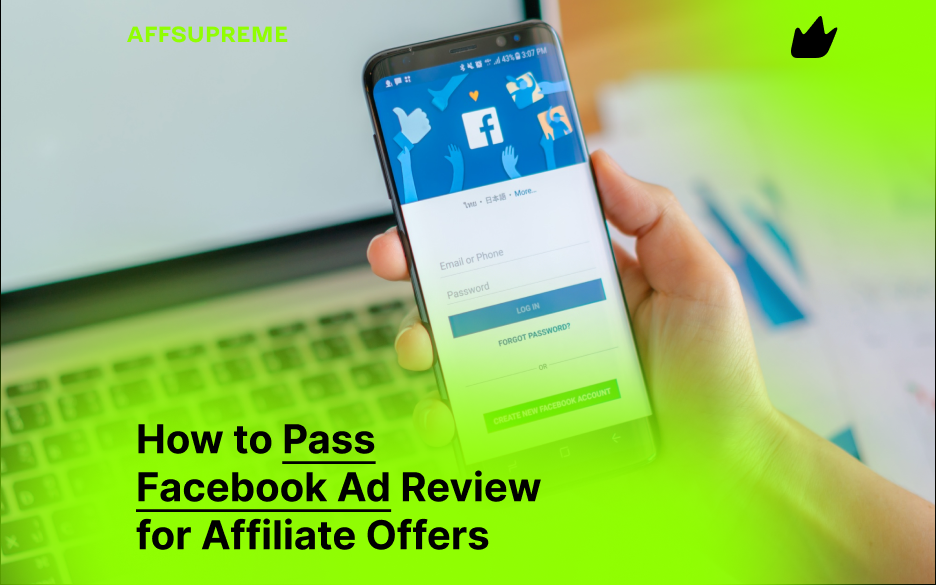Affiliate marketing through Facebook Ads can be extremely profitable — but only if your ads make it through the review process. Many affiliates and media buyers face ad rejections, account bans, or disapprovals due to violations of Facebook’s advertising policies.
In this article, you’ll learn exactly how to pass Facebook ad review for affiliate offers, avoid common mistakes, and launch compliant campaigns that don’t get flagged.
Why Facebook Rejects Affiliate Ads
Before learning how to get your ads approved, it’s important to understand why Facebook often rejects affiliate-related ads:
-
Violation of Facebook’s ad policies (e.g., misleading claims)
-
Use of low-quality or deceptive landing pages
-
Lack of transparency in your business model
-
Promoting restricted verticals (e.g., health, gambling, adult content)
-
Promising unrealistic results (e.g., “Earn $1,000 a day”)
Facebook’s algorithms — along with manual reviewers — are trained to spot these red flags, especially in affiliate and arbitrage campaigns.
How to Pass Facebook Ad Review for Affiliate Offers
1. Understand Facebook’s Advertising Policies
Many rejections happen because advertisers don’t take the time to read and follow Facebook’s policies. Key areas to pay attention to:
-
Avoid targeting based on personal attributes (age, health, financial status, etc.)
-
Never use misleading or exaggerated claims
-
Don’t include deceptive or manipulative content
-
Avoid prohibited topics or business models
Even indirect violations can get your ads rejected or your account flagged.
2. Don’t Use Direct Affiliate Links
Facebook generally does not allow direct linking to affiliate offers. Instead, use a bridge page — a landing page that provides value and prepares the user before redirecting them to the offer.
Recommendations:
-
Use your own custom domain
-
Ensure your landing page is mobile-optimized
-
Include key legal pages: Privacy Policy, Terms of Use, Disclaimer
3. Build a Clear and Trustworthy Landing Page
Your landing page should clearly explain what the product or service is, how it works, and what users can expect. Avoid exaggerated language or fake urgency.
Best practices:
-
Use educational or review-style content
-
Avoid manipulative elements like fake timers or scarcity
-
Be transparent about affiliate relationships
-
Include clear calls to action without pressure
4. Write Compliant Ad Copy and Use Quality Creatives
Avoid ad copy that overpromises or makes unrealistic claims. Do not use:
-
“Get rich fast” language
-
“Before and after” images
-
Shocking visuals or fear-based headlines
Instead, focus on:
-
Value-driven messaging
-
Realistic benefits, not guarantees
-
Clean, high-quality creatives that reflect the landing page content
5. Don’t Mention Facebook in Your Ads
Referencing Facebook or Meta in your ads is against their brand usage policies. Avoid phrases like:
-
“This is trending on Facebook”
-
“You’re seeing this ad on Facebook for a reason”
These can lead to instant disapproval or account restriction.
6. Warm Up Your Ad Account
New ad accounts are monitored more strictly. To build trust with Facebook’s system:
-
Start with low-risk, compliant campaigns
-
Run traffic or engagement ads before launching conversion-focused ones
-
Avoid scaling too fast in the first few days
Gradual and stable activity helps establish credibility.
7. Set Up Your Business Manager Correctly
Make sure your Business Manager is properly configured:
-
Verify your domain
-
Add privacy policy links to your Facebook page
-
Install and configure Facebook Pixel
-
Create conversion events based on your funnel
Avoid switching between multiple ad accounts or Business Managers for a single offer — this raises red flags.
Extra Tips to Increase Ad Approval Rates
-
Always use a branded domain name — not a generic affiliate link
-
Optimize your landing page speed — slow pages may trigger disapprovals
-
Minimize text on image creatives
-
Study what successful competitors are doing in your niche to stay current
Common Mistakes That Lead to Rejections
Here are the most frequent errors affiliates make when advertising on Facebook:
-
Linking directly to the affiliate offer without a bridge page
-
Using fake urgency like countdown timers or “only 3 items left”
-
Enabling auto-subscribe checkboxes without consent
-
Failing to disclose the nature of affiliate partnerships
These practices are either directly against policy or create a poor user experience — which Facebook strongly discourages.
Final Thoughts
Affiliate marketing through Facebook Ads is still one of the most scalable online income models — if done correctly. Compliance isn’t just about avoiding bans; it’s about building sustainable, profitable campaigns.
To pass Facebook ad review for affiliate offers:
-
Stick to the rules
-
Use high-quality landing pages
-
Write neutral, benefit-focused ad copy
-
Focus on transparency and long-term strategy
Follow these steps, and you’ll greatly improve your chances of getting your affiliate campaigns approved — and keeping them live.

